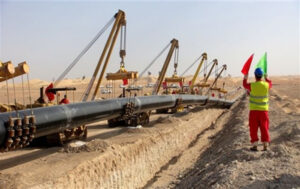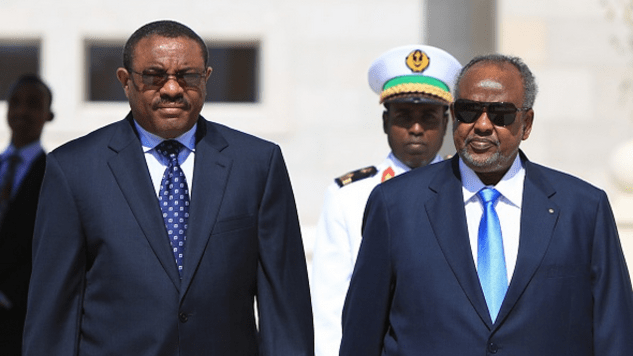Addis Ababa (HAN) October 11, 2015 – Public Diplomacy and Regional News. Ethiopia and neighbour Djibouti signed an agreement for a $1.55 billion fuel pipeline with developers Mining, Oil & Gas Services and Blackstone Group LP-backed Black Rhino Group.
The two countries in the Horn of Africa signed framework agreements on Tuesday for construction of the 550-kilometer (340-mile) line to transport diesel, gasoline and jet fuel from port access in Djibouti to central Ethiopia, the companies said. Financial close is expected in 2016, with construction scheduled for completion two years later.
Growth in landlocked Ethiopia has surpassed every other sub-Saharan country over the past decade, and the government has boosted spending to expand infrastructure. Fuel is typically delivered by tanker truck.
“The pipeline will increase energy security, aid economic development and reduce harmful emissions,” Black Rhino Chief Executive Officer Brian Herlihy said in the statement. The 50-50 joint venture with MOGS, a unit of Johannesburg-based Royal Bafokeng Holdings, will seek to raise at least $1 billion of senior debt financing.
The project, known as the Horn of Africa Pipeline, includes an import facility and 950,000 barrels of storage capacity in Damerjog, Djibouti, linked to a storage terminal in Awash, Ethiopia.
The 20-inch (51-centimetre) line is capable of transporting 240,000 barrels a day of fuel. The concession period after commercial operations start is for as many as 30 years.
Looking to conquer
Ethiopia and Djibouti have invested heavily in joint infrastructure, in a bid to make the make the Ethiopia-Djibouti belt the logistics hub of the continent in the long-term, but more immediately for the wider East and Central Africa.
In the meantime, both countries benefit from economic integration, with Ethiopia gaining access to the sea and Djibouti gaining
Nearly 99% of imports from fast-growing Ethiopia pass through its neighbour, in June the two countries oversaw the completion of a railway linking their two capitals Addis Ababa and Djibouti.
The ambition is that the link might eventually extend across the continent to West Africa.
Djibouti’s President Ismail Omar Guelleh and Ethiopia’s Prime Minister Hailemariam Desalegn attended the ceremonial laying of the last track in the 752-kilometre (481-mile) railway, financed and built by China.
The first scheduled train is expected to use the desert line in October, reducing transport time between the capitals to less than 10 hours, rather than the two days it currently takes for heavy goods vehicles using a congested mountain road.
Another new line linking Djibouti and the northern Ethiopian town of Mekele is also due to be built, but this is not the extent of the project’s ambition.
Djibouti, the smallest state in the Horn of Africa, is embarking on large infrastructure projects, building six new ports and two airports in the hope of becoming the commercial hub of East Africa.
Indicative of the strategic thinking of Djibouti, Abubaker Hadi, chairman of Djibouti Port Authority, said in June that therailway is a step towards a trans-continental line reaching all the way to the Gulf of Guinea, in West Africa.
“We are already the gateway to Ethiopia. We intend to continue this railway line to South Sudan, the Central African Republic (CAR) and Cameroon to connect the Red Sea to the Atlantic Ocean,” said Hadi.
Djibouti, the smallest state in the Horn of Africa, is embarking on large infrastructure projects, building six new ports and two airports in the hope of becoming the commercial hub of East Africa.
“Infrastructure is coming very late to Africa. It is impossible for a truck to cross the continent. To transport goods from the east coast to the west coast of Africa, it is necessary to circle the continent by boat,” Hadi said of a sea voyage that can take more than three weeks. A trans-Africa railway is feasible “in seven or eight years,” he said, as long as conflicts in South Sudan and CAR come to an end.
“Infrastructure is coming very late to Africa. It is impossible for a truck to cross the continent. To transport goods from the east coast to the west coast of Africa, it is necessary to circle the continent by boat,” Hadi said of a sea voyage that can take more than three weeks.
A trans-Africa railway is feasible “in seven or eight years,” he said, as long as conflicts in South Sudan and the Central African Republic Republic (CAR) come to an end.
Hurry up for Kenya
The reference to the conflict in South Sudan is significant, because it is seen as one of the reasons for a similar project in which Ethiopia signed up to; the Lamu Port Southern Sudan-Ethiopia Transport (LAPSSET) corridor.
LAPSSET is the Kenyan government’s biggest infrastructure project. It envisages the construction of a port, power plant, railway and other facilities from the Lamu port, through to South Sudan and Ethiopia.
A desalination plant will also be built in Lamu to address water shortages in the area.
Kenya’s Treasury has estimated the Lapsset project will cost $26 billion. East Africa’s largest economy envisages also building resort cities, an international airport and an inter-regional highway, according to the government’s website.
However, LAPSSET has been hit by delay and security problems. Lamu borders Somalia, where the al-Qaeda-linked militants have waged an insurgency since 2006.
They’ve also carried out raids along Kenya’s coast, including one in Mpeketoni, near Lamu, in June 2014 in which at least 60 people died.
The national government has taken measures to improve security in the area, including starting construction of a border fence.
The deadly new war in South Sudan, the world’s youngest nation, that broke out in December 2013 following a political fall-out between President Salva Kiir and his former deputy Riek Machar, took another layer of shine over the project.
It is not clear if the Djibouti-Ethiopia pipeline will affect Addis Ababa’s interest in LAPSSET. In all likelihood, it will be completed as it’s not affected by Somalia and South Sudan instability.
Perhaps aware that not everyone would wait, Kenya is frantically trying to jumpstart the project.
(READ: Kenya, U.S. firms in talks on mega $26 billion Lamu Port Southern Sudan-Ethiopia deal).
In July, it was reported that Kenyan and U.S. companies were negotiating a potential multibillion-dollar agreement with the Kenyan government to help develop LAPSSET.
Discussions were led by Aeolus Kenya Ltd., a closely held power and infrastructure developer known as AKL, he said in a phone interview on July 21.
The group of U.S. companies interested in the project, includes Bechtel Group Inc.
Discussions about the deal coincided with U.S. President Barack Obama’s visit to Kenya. MGA
HAN & Geeska Afrika Online (1985-2015), the oldest free independent Free Press in the region, brings together top journalists from across the Horn of Africa. Including Ethiopia, Somalia, Eritrea, Sudan, Djibouti, South Sudan, Uganda, Kenya, Oromo, Amhara, Somali, Afar and Harari. Plus, we have daily translations from 150 major news organizations in the Middle East and East African regions. Contact at news@geeskaafrika.com


Leave a Reply